
 |
|
|
|||||||
 |
|
|
Thread Tools | Display Modes |
|
|
#81 |
|
Arofanatic
  Join Date: Oct 2011
Posts: 116
|
Scrubbers compared to refugiums
If you are starting a new tank, then the obvious difference is that a scrubber gives you the option of not having a fuge at all because an upflow scrubber can be placed on top of, in, or behind, the display. There are other uses for a sump/fuge of course, but we'll only cover the filtration concerns here. A not-so-obvious difference is that a scrubber, if run together with a fuge with macros, will kill the macros even though the macros are much larger. This is because the scrubber thinks the macros are nuisance algae. Some people do run both together without killing the macros, but this is just because their scrubber is not strong enough, and actually the macros might even be slowing down the scrubber because the scrubber thinks it has to remove the macros, along with the nutrients in the water and the nuisance algae in the display. However if this works for them, good. But assuming you have to decide on either a sump/fuge or a scrubber (not both)... o Filtration with algae is proportional photosynthesis, which is proportional to Light X Air Water Turbulence Flow X Attachment. Meaning, stronger light grows more algae; stronger air/water interface turbulence grows more algae; and stronger attachment lets more algae grow without it detaching and floating away. A scrubber is thus designed to maximize Light, Flow, and Attachment. o The main problem with macros in a refugium is the self-shading that the macros do. Any part of the macro which is not directly in front of the light at any moment is not filtering. And any macro inside of a "ball" of macro (like chaeto) is self-shaded all the time. Only the surface macro that is directly in front of the light is doing any real filtering. A scrubber is designed to have all the algae in front of the light at all times. Rotating the macro does not solve the problem, because the time that the macro is rotated away from the light is time that the macro is not filtering. This is why it takes a much larger size of chaeto to do the same filtering as a scrubber. o Self-flow-blocking is another problem of macros in a refugium, for the same reason as light-blocking. And the thicker the "ball" of macro, the worse the flow-blocking. o Particle trapping is another result of a ball of macro. These particles need to cycle back around to feed the corals, but instead they get trapped in the macro and they rot, and in doing so they block even more flow and light. o With a scrubber, there is very little water standing in the way of the light. Also, the light is (or should be) very close to the scrubber... 4 inches (10cm) or less. The power of light varies with the inverse square of the distance, so going from 8" to 4" actually gives you 4X the power, not 2X. And the nutrient removal power of algae is proportional to the power of the light, because it's the photosynthesis that is doing the filtering. o Rapid flow across the algae in a scrubber gives more delivery of nutrients, compared to the slow moving water in a fuge. Filtering is proportion to nutrient flow. o The turbulence of water moving over the sections of algae in a scrubber help to remove the boundary layer of water around the algae. This boundary layer slows the transfer of metabolites in and out of the algae. There is no turbulence in a fuge (if there were, you'd have waves and bubbles). The interface between the air and water is what provides the most turbulence and boundary layer removal; there is no air/water interface in macros. o Scrubbers do not let food particles settle like a refugium does; most particles flow right out of the scrubber. o Scrubbers do not (if cleaned properly) release algal strands into display, like chaeto does. o Scrubbers do not go sexual, like caulerpa can. o Scrubbers do grow lots of pods; more than was previously thought, especially if not cleaned with freshwater. o Scrubber don't, obviously, provide a place for snails and crabs, etc. However, if you already have a sump with an empty compartment, and you don't mind using all of it and putting a light over it, then maybe it's easier and cheaper to try macros first. -NP |
|
|

|
|
|
#82 |
|
Arofanatic
  Join Date: Oct 2011
Posts: 116
|
Cleaning Off Slime On New Scrubbers
When scrubbers are new, they will almost always first develop a slimey first layer of growth. This is because diatoms and dino's, which make up most of the slime, are the quickest to be able to "colonize" a new surface, sort of like weeds in a new garden. This slime layer will not get any thicker, however, because slime cannot attach well (it has no "roots") to the growth surfaces of the scrubber, and thus will get washed away when it gets thick, Also, it prevents green hair algae from attaching because of the slippery texture of the slime. So when your scrubber is new, be sure to take it to the sink and use a toothbrush to clean all the slime off of the growth surfaces so you can see all white surfaces again. You could clean it while still in your tank if you don't mind the slime particles floating around, but most people would probably do better to take it to the sink (or outside; slime makes great fertilizer). Slime, especially when dark or black, is also an indicator that you can use more watts or hours of light. Once you have cleaned off the slime for one or more growth periods, you should start seeing green hair algae take hold. [img]http:/www.algaescrubber.net/SlimePics.jpg[/img] -NP |
|
|

|
|
|
#83 |
|
Arofanatic
   Join Date: Jan 2009
Posts: 336
|
Great sharing!
Started mine about 2 weeks ago. Can see some algae hair growing already but NO3 still high. NO2 is zero. |
|
|

|
|
|
#84 |
|
Arofanatic
  Join Date: Oct 2011
Posts: 116
|
PowerPoint presentation for clubs, schools, etc., to learn the basics of scrubbers:
http://www.algaescrubber.net/AlgaeScrubbers.pps or http://www.algaescrubber.net/AlgaeScrubbers-plain.pps -NP |
|
|

|
|
|
#85 |
|
Arofanatic
  Join Date: Oct 2011
Posts: 116
|
Here are some scrubber results I collected:
"[Scrubber] is working incredible well. Went from constant algae outbreaks (3-4 per year), to no algae at all. 10 yr old 250 gal reef tank, started developing blooms at year 7. Nothing else worked, even breakdown and rebuilds." -- Joe Lopez "I recent removed bio-pellets, GFO, and trimmed off a lot of macro algae. Oh yeah, overfeeding now to try and bring up my phosphates. Since removing a bunch of nutrient exporting systems like bio-pellets, GFO, and a second algae scrubber, my [scrubber] has been growing nuts. It's been less then 7 days and I have to remove more. People are surprised when I open up the [scrubber] and show them what I pull out with one hand" -- ReeferEric on the R2R site. pics: "I pull a handful out every week" -- Choff on the R2R site. "Everything is working great, got two of them on my system" -- Kenneth Salomon Dan Budz: 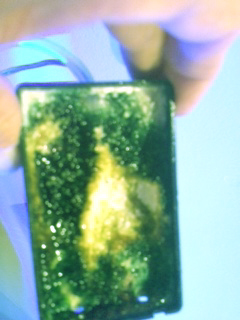 "The [scrubber] is working well" -- JT Powell "All I can say about the [scrubber] is WoW. It completely wiped out my severe case of Cyano Bacteria in 4 weeks, it is working like a champ. I was a little skeptical that it would work at first because it's very compact, but I am completely amazed on how great it's working." -- John Quezada "My [scrubber] is working great" -- Stefan Kolev "Happy to report that the [scrubber] is growing lots of hair algae" -- Kidtango on the R2R site "[Scrubber] is growing thick and fast" -- Carl Knowles "Boom... 7 days growth from my [scrubber]" -- rdevoe11, pic: 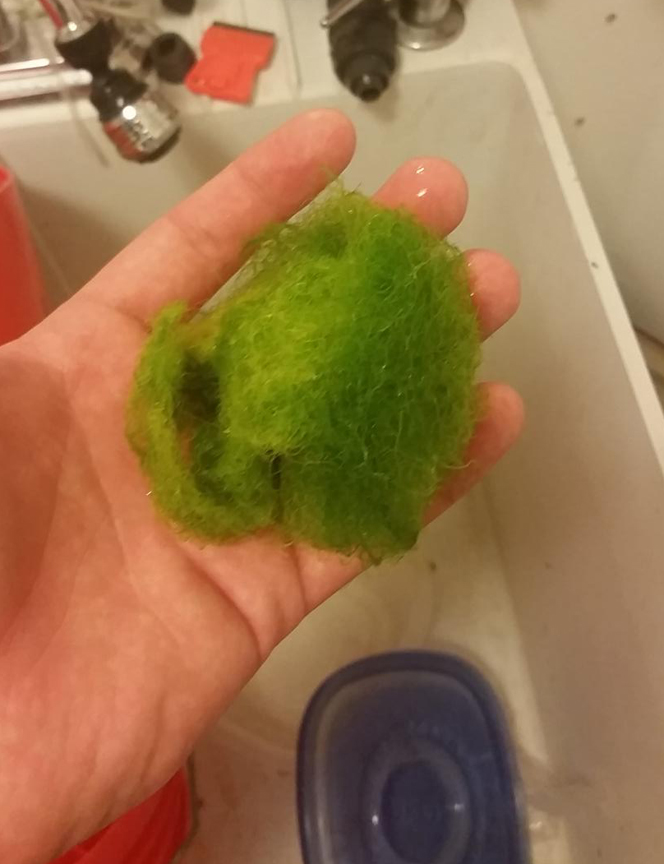 Other pics: Matthew Coulthard: 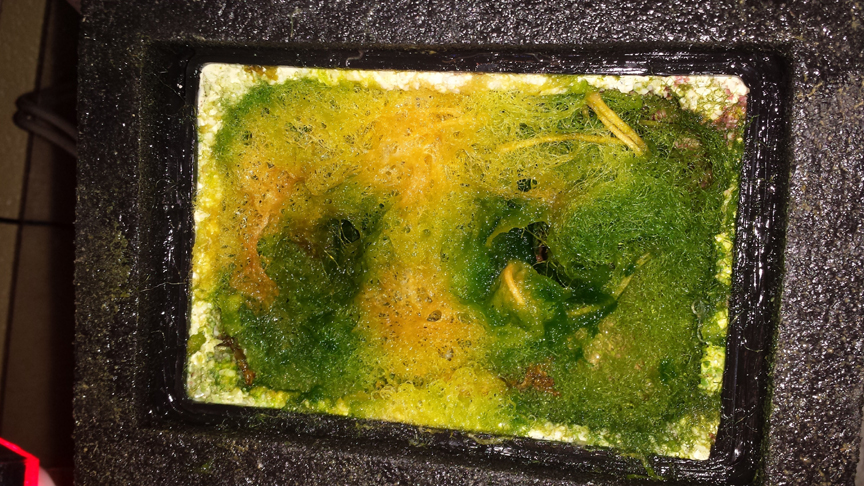 Nicolay Oganesian:  Yuppy Suhandinata:  -NP |
|
|

|
|
|
#86 |
|
Dragon
     Join Date: Oct 2004
Posts: 870
|
Nice write-up & focus on Algae
|
|
|

|
|
|
#87 |
|
Arofanatic
  Join Date: Jan 2014
Posts: 60
|
Hi guys,
I'm not fantastic with DIY. Anyone know where I can buy an upflow algae scrubber? |
|
|

|
|
|
#88 |
|
Arofanatic
  Join Date: Oct 2011
Posts: 116
|
Here are some upflow layout designs to give you ideas of what might fit your tank or ability to DIY better:
http://www.algaescrubber.net/Post1.jpg (simple upflow screen) http://www.algaescrubber.net/Post2.jpg (attach to glass) http://www.algaescrubber.net/Post3.jpg (bubble remover) http://www.algaescrubber.net/Post4.jpg (attach to glass, with compartment) http://www.algaescrubber.net/Post5.jpg (attach to glass, small) http://www.algaescrubber.net/P6.jpg (hang on back) http://www.algaescrubber.net/P7.jpg (collector) http://www.algaescrubber.net/P7.jpg (floating) -NP |
|
|

|
|
|
#89 |
|
Arofanatic
  Join Date: Oct 2011
Posts: 116
|
Dark Slime and Black Slime - what it looks like
Here are some examples of dark slime, and black slime. Usually slime it starts on new scrubbers which have high measurable nutrients in the water, or on small scrubbers on big tanks with lots of rock where the scrubber is not big enough to pull the nutrients out fast enough. Notice that some of them have white patches; this is because the slime let go and floated away, leaving white surfaces behind. In all cases, just take it to your sink and toothbrush them (without toothpaste) so that you can see the white surfaces again.  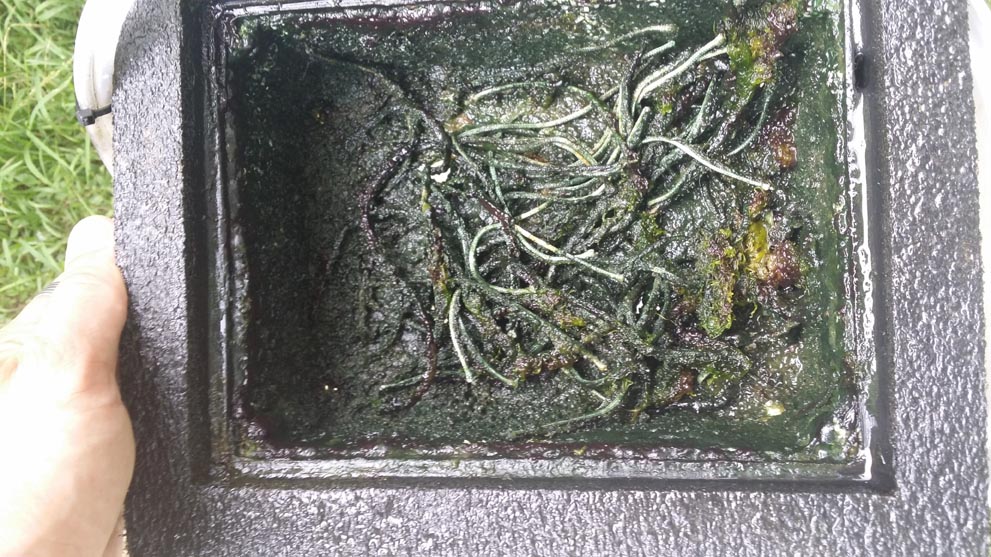  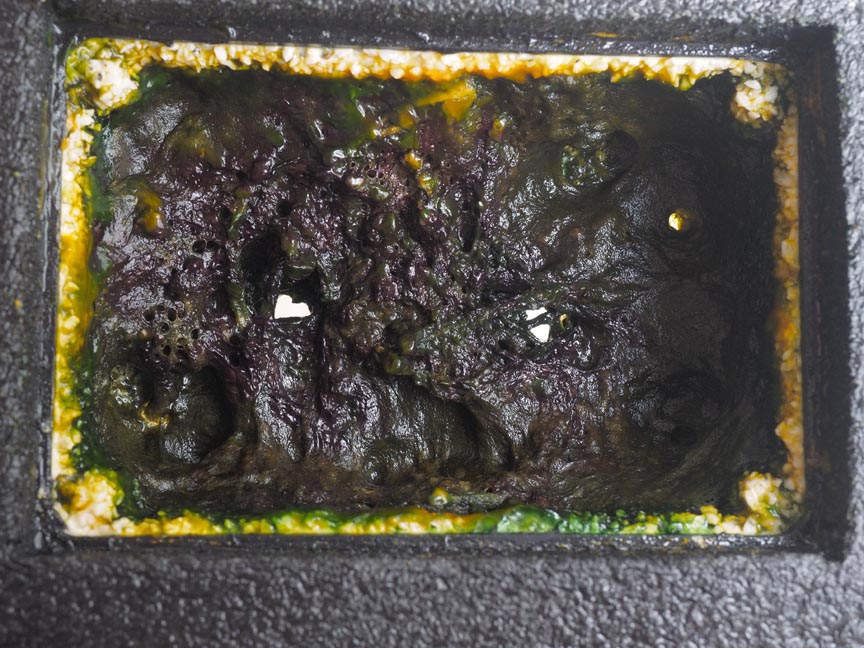    
|
|
|

|
 |
|
| Tags |
| algae, ats, nitrates, phosphate, uas |
| Currently Active Users Viewing This Thread: 3 (0 members and 3 guests) | |
|
|